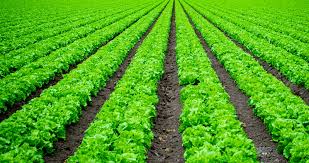![]()
If you’ve landed on this article page, you’re probably searching for a
good business idea—an idea that’s light on the pocket but heavy on
returns, promising both a fulfilling journey and potential profit.
|
How To Start A Lucrative Lettuce Farming Business In Nigeria
Lettuce farming business is a viable and profitable agricultural
venture in Nigeria
Lettuce (Lactuca sativa) is a leafy vegetable crop that is
highly nutritious and can be grown all year round in different
climatic conditions. Nigeria is the largest economy in Africa
with a population of over 200 million people, and the demand for
lettuce is on the rise due to the increasing awareness of
healthy eating habits.
Nigeria has a favorable climate for lettuce production, with
different ecological zones suitable for its cultivation.
According to the National Horticultural Research Institute
(NIHORT), lettuce farming has the potential to generate
significant revenue for farmers in Nigeria. In addition, the
export market for lettuce from Nigeria is promising, especially
to Europe and other African countries.
Lettuce farming requires suitable soil, proper irrigation, and
pest and disease management. There are different varieties of
lettuce, including loose-leaf, romaine, butterhead, and iceberg
lettuce, which have different growth requirements and yields.
Depending on the variety, lettuce can be harvested within 40 to
80 days of planting, and yields can range from 10 to 40 tons per
hectare.
Salad production: Lettuce is a major component of salads, and
there is a high demand for salad ingredients in Nigeria and
Africa.
Vegetable market: Lettuce is a commonly consumed vegetable in
Nigeria and Africa, making it a profitable crop for farmers.
Juice production: Lettuce is used in juice production as it has
a high water content and is rich in nutrients.
Export market: Nigeria and Africa have a high demand for fresh
vegetables in the international market, and lettuce can be
exported to other countries.
Supermarkets and grocery stores: Lettuce is a common product in
supermarkets and grocery stores, making it a profitable crop for
farmers.
Restaurant supply: The restaurant industry is one of the largest
consumers of lettuce, and there is a constant demand for fresh
produce.
Catering business: Lettuce is used in catering services as an
ingredient in salads, sandwiches, and other dishes.
School feeding program: Lettuce can be supplied to schools for
use in their feeding programs, providing a steady source of
income for farmers.
Organic food market: There is a growing demand for organic food
in Nigeria and Africa, and lettuce can be grown organically for
this market.
Livestock feed production: Lettuce can be used as livestock
feed, providing a source of income for farmers and reducing
waste.
Vegetable oil production: Lettuce seeds contain oil, which can
be extracted for use in the food industry.
Biofuel production: Lettuce can be used in the production of
biofuels, providing a sustainable energy source.
Medicinal purposes: Lettuce has medicinal properties and is used
in traditional medicine for various ailments.
Cosmetics industry: Lettuce extract is used in the cosmetics
industry for its skin-softening properties.
Here are some steps to follow in processing and packaging
lettuce in Nigeria and Africa:
Harvesting: Harvest lettuce early in the morning or late in the
evening when the temperature is cool to prevent wilting.
Washing: Wash the lettuce leaves thoroughly with clean water to
remove dirt and debris.
Drying: After washing, dry the lettuce leaves with a salad
spinner or a clean cloth to remove excess moisture.
Sorting and Grading: Sort the lettuce leaves according to size
and grade. The larger and higher quality leaves should be
separated from the smaller and lower quality ones.
Packaging: Package the lettuce in clean, airtight containers or
bags to prevent moisture loss and contamination.
Storage: Store the lettuce in a cool, dry place to maintain its
freshness and nutritional value.
Transportation: Transport the packaged lettuce to the market or
customers using a clean and well-ventilated vehicle.
Proper processing and packaging can help increase the shelf life
of lettuce, reduce spoilage, and maintain its quality, leading
to higher profits for the lettuce farming business.
Types Of Equipment & Tools Used In The Lettuce Farming Business
In Nigeria or Africa
To successfully process, package, and supply lettuce in Nigeria
and Africa, the following equipment may be required:
Irrigation systems: To maintain adequate soil moisture for
lettuce growth and development.
Harvesting knives or scissors: Used to cut the lettuce leaves
and ensure that the head stays intact.
Sorting and grading machines: Used to sort and grade lettuce
leaves based on size, color, and shape.
Washing and cleaning machines: Used to clean and wash the
lettuce leaves, ensuring that they are free from dirt, debris,
and contaminants.
Drying machines: Used to remove excess moisture from the lettuce
leaves after washing.
Packaging machines: Used to pack the lettuce leaves into various
packaging formats, such as bags or cartons.
Storage facilities: Used to store the lettuce leaves before they
are transported to the market.
Transportation vehicles: Used to transport the lettuce leaves
from the farm to the market.
Cooling and refrigeration systems: Used to keep the lettuce
leaves fresh and prolong their shelf life.
Weighing scales: Used to weigh the lettuce leaves and ensure
that they meet the required weight specifications.
These equipment help to ensure that the lettuce is well
processed, packaged, and supplied to the market in a timely and
efficient manner, ensuring the quality and freshness of the
product is maintained.
Get our guide on how to start a profitable Lettuce Farming
Business in Nigeria.
The body of this work is formed from consulting experienced and
relevant people running the Lettuce Farming Business, to get
first-hand information about the success secrets and marketing
strategies deployed to achieve business success
|







